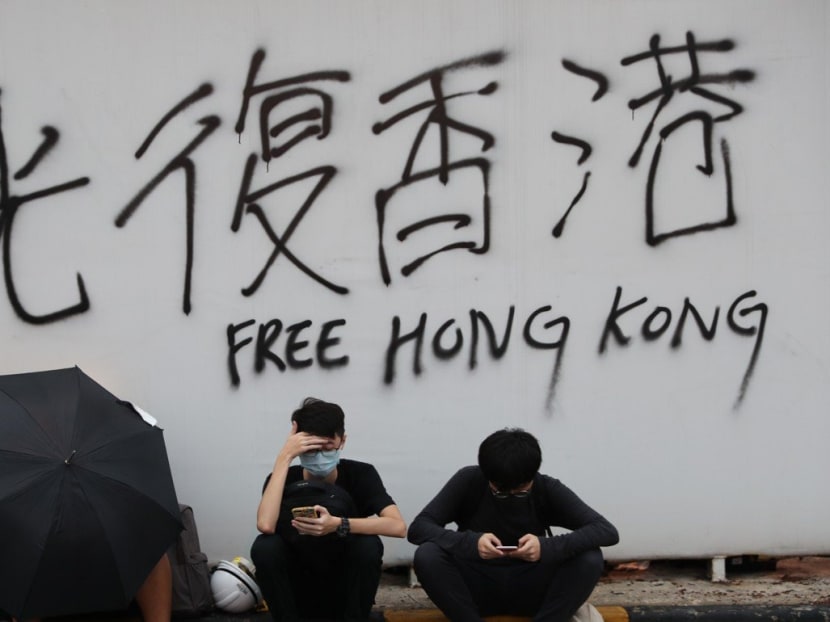Hong Kong braces for largest citywide strike in decades on Monday
HONG KONG — Hong Kong is bracing for the largest citywide strike in decades on Monday (Aug 5), after about 14,000 people from 20 sectors vowed to join the industrial action against the now-abandoned extradition bill, first called for by staff unions of transport operators and social workers.

Hongkongers have long put work as a priority. But now some people are defying that and supporting the five demands of the anti-extradition movement, including a full withdrawal of the now-abandoned bill and an independent investigation into police’s use of force on the demonstrators.
HONG KONG — Hong Kong is bracing for the largest citywide strike in decades on Monday (Aug 5), after about 14,000 people from 20 sectors vowed to join the industrial action against the now-abandoned extradition bill, first called for by staff unions of transport operators and social workers.
But business leaders have warned the employees of a government and an economic backlash.
Protesters were set to launch the strike in eight districts — Admiralty, Mong Kok, Sha Tin, Tai Po, Tsuen Wan, Wong Tai Sin, Tuen Mun and around the theme park Hong Kong Disneyland Resort.
Police said on Saturday they had received applications for rallies from six districts and issued no-objection letters for Admiralty, Wong Tai Sin and Tuen Mun.
Hongkongers have long put work as a priority. But now some people are defying that and supporting the five demands of the anti-extradition movement, including a full withdrawal of the now-abandoned bill and an independent investigation into police’s use of force on the demonstrators.
On Saturday, nine people, many of them wearing masks, said in a press conference they had gathered 14,000 locals from more than 20 sectors, and some had already applied for leave to take part in the strike.
A spokesman for the strike’s organising committee who gave his name only as Chan, said they were left with no option but to go on strike as the government “did not pay heed to people’s demands”.
“Various sectors have expressed their views in most peaceful ways. But, the government did not listen to them,” he said.
“A lot of protesters were attacked with violence, and persecuted by a tyranny … When society has become like this, we need to paralyse it temporarily to force the government to face the problems.”
At the same event, a person from the insurance industry who identified himself as Poon, said he hoped employers would not punish their workers for taking part in the strike.
“Some frontline insurers specialise in clients from mainland China, who trust Hong Kong’s legal system. But the government here has repeatedly challenged our rule of law. I hope the insurers stop meeting their clients for a day and go on strike,” he said.
With workers from sectors — such as finance, civil service, education and arts and culture — expected to join the strike, the city, which always prided itself for being efficient and convenient, could see large-scale disruptions on Monday.
Earlier, labour unions from five airlines, two in the bus industry and one for the city’s railway called on their members to go on a strike and 33 social services were expected to be suspended as more than 2,000 social welfare workers showed their support to the movement.
Police said it was regrettable that some people had called for initiating an uncooperative movement – such as obstructing doors at MTR stations, besieging bus stations and staging clashes in tunnels.
“We will have close communication with MTR authorities and enter stations to help maintain order if needed,” a senior superintendent of Kowloon West Regional Headquarters Cheung Wai-wah said.
When asked whether anti-riot vehicles armed with water cannons would hit the streets, he said the vehicles had been undergoing road tests and could be deployed if they were considered fit, but only under exceptional circumstances.
“There are strict deployment guidelines. Use of the vehicles will be considered only in case of serious casualties, massive road blockages or destruction of public property,” he said.
Nearly 40 coffee shops and at least 45 other businesses, including local travel agency Morning Star Travel, would down their shutters on Monday to express their solidarity with the movement.
More than 30 programme hosts from two broadcasters — Commercial Radio and the state-run RTHK — also gave their backing.
Mr Dennis Ng Wang-pun, president of the Chinese Manufacturers’ Association, said foreign firms had not lost confidence in Hong Kong, while adding the strike would be unlikely to change the government’s stance.
“Do you think the government will kneel down? If I was the government, I would only get tougher. If it compromises because of some radical acts, how can it govern the city?” Mr Ng said on a radio show.
Mr Law Ka-chung, chief economist and strategist at the Hong Kong branch of Bank of Communications, said the strike would not have a serious impact on the city’s economy.
“Retail may be affected as shops will be closed. But the city’s economy is all about large commercial transactions and infrastructure, which might not be directly hit,” he said.
Strikes have been rather rare in Hong Kong. One of those that made headlines was the 2013 Hong Kong dock strike, which lasted 40 days. It was said to have involved about 530 dockers who were unhappy with their employers. Another well-known industrial action was initiated by steel fixers in 2007. SOUTH CHINA MORNING POST









